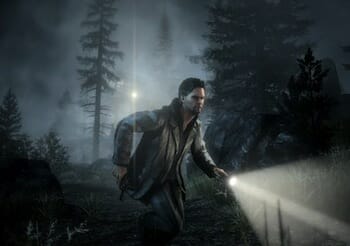Alan Wake
(Xbox 360)

Developer: Remedy
Publisher: Microsoft Game Studios
Platform: Xbox 360
One novelist’s sabbatical gone horribly, horribly wrong
Celebrity writer Alan Wake has got it made. Every novel he publishes jumps to the top of the best-seller list. He lives in a ritzy New York City apartment with a private terrace and dazzling view. He’s happily married and has a literary agent who knows how to close a deal. There’s only one problem: Wake hasn’t been able to put a word to paper for more than two years. The creative spigot has shut off and the only thing left flowing at this point is a niggling trickle of self-doubt.
At his wife Alice’s insistence, Wake decides a temporary change of scenery will do them both good. After all, the floor-to-ceiling bookshelves spanning one wall of Wake’s living room aren’t exactly helping him get his mind off things. Their getaway destination: the quaint waterfront town of Bright Falls, Washington, nestled against the mountainous, densely wooded grandeur of the Pacific Northwest. Surely some fresh air and open space will uncork the creative juices.
Unfortunately Wake’s dysphoria is about to spiral deeper as he begins stumbling across loose-leaf pages of his latest manuscript—a horror novel entitled “Departure”—that he doesn’t remember writing. Even stranger, the chilling plot twists and supernatural aberrations recounted in the pages somehow manifest themselves in the real world. Alice vanishes mysteriously into thin air. Many of Bright Falls’ residents, perfectly congenial by day, are possessed by an evil force called The Dark Presence once night descends. If Wake is to have any chance of seeing his wife again, he must figure out how to wrest back control of this tale and craft a new ending.
Alan Wake, a years-in-the-making project by Finnish game studio Remedy, marks the first teetering steps of a new era in videogame storytelling. Game enthusiasts and developers have long had a computer-chip on their shoulder about how little respect the wider culture affords videogames. True believers bristle at the establishment culture’s suggestion that games are somehow irrelevant, a tawdry enchantment for the terminally under-mature. Every time President Obama mentions the word “Xbox,” you can be sure it’s in the context of urging parents to steer their kids toward a more enriching pursuit.
But here’s the kicker: games haven’t exactly thrown open their arms to the wider culture either. Videogame narratives—even the more accomplished examples like Grand Theft Auto IV, BioShock and Mass Effect—have contented themselves with fictional worlds that exist in a parallel dimension. Liberty City, for example, as opposed to New York City. Fallout 3’s action occurs in Washington, D.C., but its apocalyptic ruins bear little resemblance to the city’s real-world counterpart.
This approach has opened the door for richly woven parody and fable, but why have game designers, at least historically, been so shy about referencing our real world and culture? For all the ‘hooah!’-barking bravado they pack into their games, the jokers at Infinity Ward couldn’t even admit their game was obviously set in Baghdad. I mean, c’mon.
One of Alan Wake’s primary antagonists, FBI Agent Nightingale, has made it his mission in life to apprehend Wake. Nightingale is an insufferable asshole and the game doesn’t bother to make him empathetic in any way. He’s a laughably two-dimensional character, exhibiting roughly the same level of emotional depth as the life-sized Alan Wake promotional cardboard cutout that serves as a comedic prop at various points in the game. While Agent Nightingale may be a flimsy caricature of every asshole cop from every action movie ever made, his habit of jeering Wake by calling him by the name of other writers (some canonical, some populist) set off alarm bells in my head. Over the course of the game, he calls Wake names such as ‘Dan Brown,’ ‘James Joyce,’ ‘Stephen King,’ even ‘Bret Easton Ellis.’
-

-

-

-

-

-

-

-

-

-

-

-

-

-

-

-

-

-

-

-

-

-

-

-

-

-

-

-

-

-

-

-

-

-

-

-

-

-

-

-









































